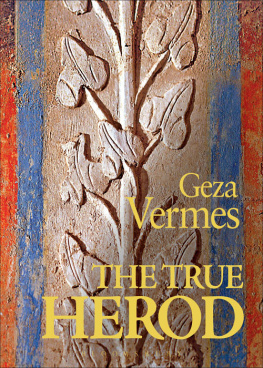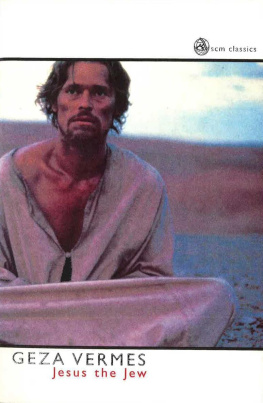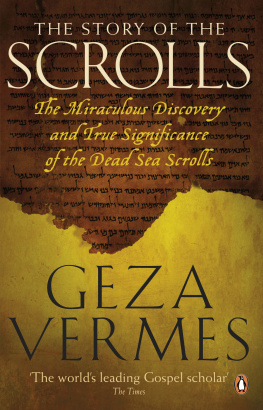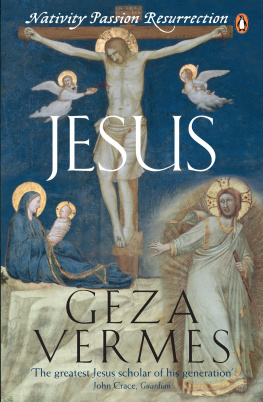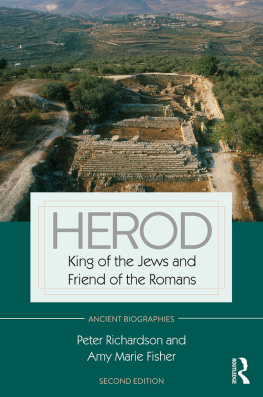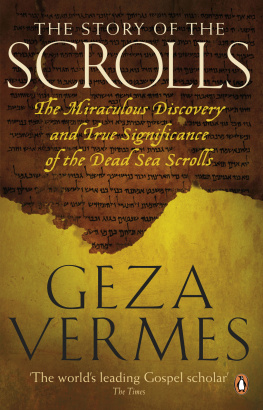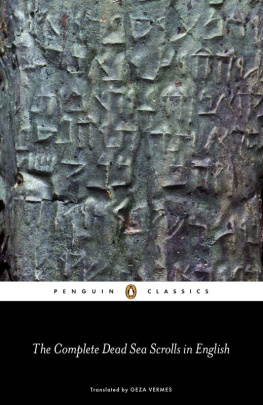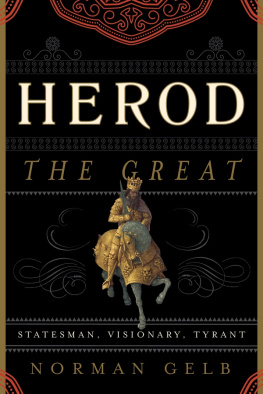

Contents

The origin of this book was not centred on one idea but a myriad of unstructured tales and loose ends that grew into one story. The True Herod is very special to me as it is published after the death of my late husband and is full of memories. It was neither commissioned, nor the result of serious study, unlike most of his other books, and it took years of story-telling and good fortune to grow into a publication. The stories, accounts and snippets contained in this volume accompanied our life together for many years; he told them to entertain me whether on rainy trips to London or sunny journeys towards the Mediterranean. I remember him announcing, with a twinkle in his eyes, Darling, now we are heading towards civilisation as we crossed the bridge over the Loire before launching into another bawdy encounter between Cleopatra and Herod.
The lives of the major Roman, Jewish and Egyptian players from the time of Jesus had intertwined relationships, and their respective cultures rubbed against each other. But in tying this period together, Geza saw Herod as one of the pivotal axes around which his contemporaries revolved. Despite being mostly negatively portrayed, and seldom debated, he does not make for a poor hero; for beyond the treachery and violence, his power and passion brought peace and prosperity. It was these misconceptions that Geza loved to challenge, and thus the book was born, or at least the main part of it. However, for some time it lay quietly on his desk and, for various reasons, it sank to the bottom of the pile.
In early January 2013, on a day when a sudden snowfall had paralysed Oxford and brought the rest of Britain to a standstill, a young and friendly editor from Bloomsbury arrived at our doorstep perfectly on time, impressing Geza, who had been anxious the man would not appear. While they discussed revisiting an earlier publication, the conversation happily turned to new ideas and by the warmth of the fireside, the dust from The True Herod was blown off. That evening, he informed us from a coach to London that he was the sole passenger but also that he would take on the book. I suspect, though cold and alone, he was as jubilant as the author. Geza set to work the next morning, and the manuscript grew until it was finished on 31st March. I later noticed, while editing this book, some final adjustments had been made to the digital files just four days before Geza died. He passed away peacefully from a complication of his chemotherapy on the 8th May 2013.
Gezas writing has the ability to surprise us, to nourish our imagination and to touch us, leaving us with something that stays forever. I hope this book will provide the readers with some colourful and inspiring glimpses into this other world.
15th December 2013 Margaret Vermes

For many years I have been fascinated by the figure of Herod the Great (c. 734 BCE ). Having read and re-read Josephus accounts in the Jewish War and Antiquities, and having attempted to discount the pro-Herodian and pro-Hasmonaean bias in the two works, I easily reached the conclusion that both the Christian and the Jewish rabbinic traditions have faced us with a caricature of the true Herod. Herod was not an enemy of the Jews, nor was he guilty of the massacre of the babes in Bethlehem as the evangelist Matthew would like his readers to believe. He was heroic and horrible. A genius in politics as well as a giant in architecture and planning, he was at the same time shamefully vindictive towards those he considered potential rivals or opponents, including the close members of his family. He was a typical split personality and his two opposite qualities turned him into a genuine tragic hero. It is amazing that no top class filmmaker has yet discovered these latent potentials and raised him to stardom as they did with his classical contemporaries, Julius Caesar and Antony and Cleopatra. No doubt they were unable to recognize that the lens of the Christian tradition provided them with a grossly distorted image of the real Herod.
However, a good historian should not allow Herods generally known weaknesses to obscure his greatness, nor the negative aspects of his complex personality to obfuscate his brilliant and, yes, I will dare say it, his kindness and generosity towards his subjects, Jewish and non-Jewish, in their hours of need. As a recent writer aptly put it, appropriating Graham Greenes formula, Herod was truly the Third Man in the Roman Empire of his age, who was preceded only by Augustus and his best friend, Agrippa, with the King of the Jews being the next best and influential friend of both.
In this richly illustrated account, Herod and his successors down to the third generation are set within the framework of Jewish and Graeco-Roman history, with a birds eye view back to the age of David (c. 1000 BCE ) and a forward look to the aftermath of the Jewish rebellion against Rome in the final decades of the first century CE . The book is meant for all and sundry, with no prior requirement beyond a basic education. I hope the readers will find the pages and pictures that follow instructive and entertaining, in short, a good read.
Oxford, 31st March 2013 Geza Vermes

While finalizing the manuscript last March we learnt that a magnificent exhibition Herod the Great The Kings Final Journey had been mounted in The Israel Museum of Jerusalem. The author greatly benefited from an early copy of the lavishly illustrated and rich catalogue. Sincere thanks are expressed here to David Mevorah, Silvia Rozenberg and Boaz Zissu for their kind assistance. In the search for illustrations, special gratitude is extended to Danny Syon for his generous help and a superb collection of coin images, and to Zeev Weiss for his expertise. The editorial work has greatly benefited from the cordial support and advice of many of our close friends, especially of Fergus Millar, Tessa Rajak, Martin Goodman and Nicholas de Lange. I am deeply indebted to Dominic Mattos from Bloomsbury and his editorial team for a friendly collaboration on the preparation of this book, and to Jonathan Kirkpatrick, Kimberley Czajkowski and Jane Barlow for giving me a helping hand. My warmest thanks go also to my son Ian for his readiness to help me at any time, day or night.
M.V.

| Ant. | Josephus, Jewish Antiquities |
| b | bavli = Babylonian Talmud, followed by the name of the tractate |
| BAR | Biblical Archaeology Review |
| CD | Cairo Damascus Document |
| Dan | Daniel |
| DSD | Dead Sea Discoveries |
| Ecclus | Ecclesiasticus or Wisdom of Ben Sira |
| Ezek | Ezekiel |
Next page
